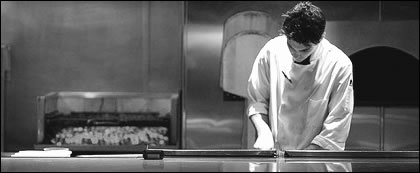
The effects of smell are rarely researched in psychological studies. That’s why it’s great to come across this study by Gueguen and Petr (2006) on the effect of different smells on how much time and money people spend in a restaurant. But not, as you might imagine, the smell of the food, but the smell of lavender.
A very small (22 place-setting) pizzerria in Brittany, France, was the site for this fascinating experiment. On three apparently identical Saturdays in May, three different experimental conditions were tested. In the first condition no aroma was dispersed – other than that occurring in the natural course of cooking and serving pizzas. On the second Saturday, the smell of lemon was diffused into the atmosphere of the restaurant. Finally, on the third Saturday, it was the turn of lavender.
The authors tell us there were no significant differences in the weather conditions or in the patrons of the restaurant on the three evenings.
Lemon, generally found to be an activating smell, did increase the amount of money spent but not by a statistically significant amount. It was actually the relaxing scent of lavender that increased spending per person from 17.5 Euros to 21.1 Euros on average. That’s a statistically significant 20% increase. Not a bad return on the investment of three electric fragrance diffusers.
But unfortunately for all Gordon Ramsay wannabes, I have discovered a potentially fatal flaw in the plan. Not only did spending go up in the lavender condition, but so did the average amount of time spent in the restaurant, from 91.3 minutes to 105.7 minutes – about 15%.
In busy restaurants, owners often want a high throughput of diners. More covers equals more cash-o-la. People hanging around drinking coffee and soaking up lavender aren’t necessarily racking up the profits. On the other hand, on quiet nights, it’s better to be selling those coffees than not and a half-full restaurant always looks better to passing trade than one that’s almost empty.
(Warning: the following sentences contain puns – please look away if you’re of a nervous disposition.)
So here it is for you Gordon, on a plate: only use the lavender on quiet weekdays when you want people to hang around, but can it Friday and Saturday nights.
You see it’s not all pie-in-the-sky here on PsyBlog, fat cats are also catered for.
Stop groaning, I did warn you.


